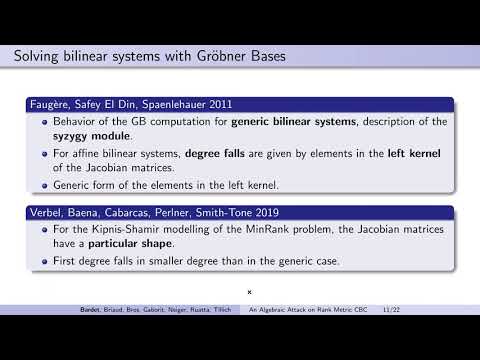| Authors: |
- Magali Bardet , LITIS, University of Rouen Normandie, France, and Inria, 2 rue Simone Iff, 75012 Paris, France
- Pierre Briaud , Inria, 2 rue Simone Iff, 75012 Paris, France
- Maxime Bros , Univ. Limoges, CNRS, XLIM, UMR 7252, F-87000 Limoges, France
- Philippe Gaborit , Univ. Limoges, CNRS, XLIM, UMR 7252, F-87000 Limoges, France
- Vincent Neiger , Univ. Limoges, CNRS, XLIM, UMR 7252, F-87000 Limoges, France
- Olivier Ruatta , Univ. Limoges, CNRS, XLIM, UMR 7252, F-87000 Limoges, France
- Jean-Pierre Tillich , Inria, 2 rue Simone Iff, 75012 Paris, France
|
| Abstract: |
The Rank metric decoding problem is the main problem considered in
cryptography based on codes in the rank metric. Very efficient schemes based
on this problem or quasi-cyclic versions of it have been proposed recently,
such as those in the submissions ROLLO and RQC currently at the second round
of the NIST Post-Quantum Cryptography Standardization Process. While
combinatorial attacks on this problem have been extensively studied and seem
now well understood, the situation is not as satisfactory for algebraic
attacks, for which previous work essentially suggested that they were
ineffective for cryptographic parameters.
In this paper, starting from Ourivski and Johansson's algebraic modelling of
the problem into a system of polynomial equations, we show how to augment
this system with easily computed equations so that the augmented system is
solved much faster via Gröbner bases. This happens because the augmented
system has solving degree $r$, $r+1$ or $r+2$ depending on the parameters,
where $r$ is the rank weight, which we show by extending results from Verbel
\emph{et al.} (PQCrypto 2019) on systems arising from the MinRank problem;
with target rank $r$, Verbel \emph{et al.} lower the solving degree to $r+2$,
and even less for some favorable instances that they call
``superdetermined''. We give complexity bounds for this approach as well as
practical timings of an implementation using \texttt{magma}. This improves
upon the previously known complexity estimates for both Gröbner basis and
(non-quantum) combinatorial approaches, and for example leads to an attack in
200 bits on ROLLO-I-256 whose claimed security was 256 bits. |

